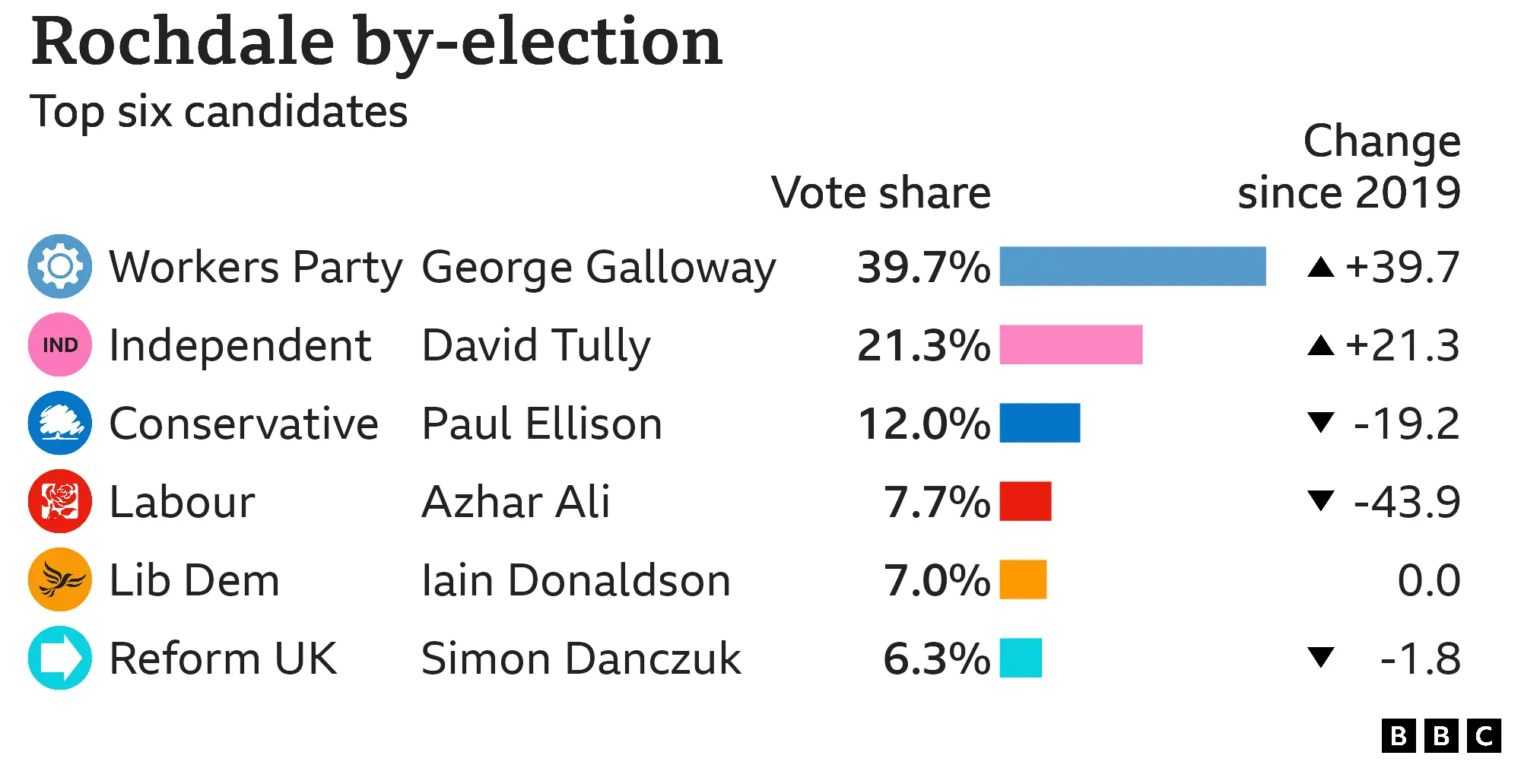Rochdale by-election: How worried should Keir Starmer be after George Galloway win?
 PA Media
PA MediaThe conflict in the Middle East has had a profound effect on UK politics.
Earlier this week, Rishi Sunak warned of "polarisation" in the debate.
That was personified on the one hand by the former Conservative deputy chairman, Lee Anderson, who was accused of making Islamophobic comments about London mayor Sadiq Khan.
And on the other by the disowned Labour candidate at the Rochdale by-election, Azhar Ali. He made remarks widely alleged to be antisemitic.
But does the drama of George Galloway's victory in Rochdale really represent a crisis for mainstream parties?
The winner claimed he'd given them a spanking.
Sure, the Conservative vote plummeted in Rochdale by 19 points.
But in campaigns where the Middle East conflict was less of a prominent issue, it also fell substantially - by 21 points in the recent Kingswood by-election and by 37 points in Wellingborough.
What, then, does the Rochdale result tell us about Labour?
I would be hesitant about reaching sweeping conclusions.
The party clearly messed up in the selection of its candidate and in initially hesitating to disown him.
Sir Keir Starmer apologised to the town's voters earlier on Friday.
Nonetheless, disown Mr Ali they did. The party closed down its campaign headquarters and ordered members not to knock on doors for him.
Therefore, it is impossible to know if Mr Galloway would have had a sweeping victory - or any victory at all - if Labour had actually campaigned there.

To avoid potentially damaging divisions, the Labour leadership's position on Gaza has recently "evolved", with calls for a "humanitarian pause" scaled up to a demand for an "immediate humanitarian ceasefire".
So what remains untested is whether pro-Palestinian voters would have welcomed this shift, or punished the party for the time it took to get there.
The Rochdale result is certainly more than a little local difficulty for Labour.
Some of the party's MPs shared privately their thoughts on the Galloway victory.
Overall, the feeling was one of depression.
And in some cases, apprehension.
There was a fear that more division within and between communities could be fostered.
They felt Mr Galloway's victory - and imminent return to Parliament - had granted him a platform and that his contribution to politics would be toxic.
And it was not just the view of left-wing Labour MPs that a perceived slowness by the leadership to shift position on Gaza had helped create a space in which Mr Galloway could thrive.
However, they all felt the party's policy was now in the right place.
It seems unlikely that Rochdale is a harbinger of wider electoral doom.
Labour easily won the by-elections in Kingswood and Wellingborough, which took place after the Rochdale candidate row blew up and before Labour called for a "humanitarian ceasefire".
These two areas do not have large Muslim populations, unlike Rochdale, where about 30% of the electorate are Muslim.
But party insiders say in their focus groups, the phrase they hear most often is "time for a change".
So Mr Galloway - and whatever else he is, he is a talented campaigner - was the change in Rochdale.
He dedicated his victory to Gaza, but he also campaigned on local as well as global issues in Rochdale - such as the declining state of the town centre and its lack of a maternity ward.
So he perhaps articulated concerns which some voters felt had previously gone unheeded.
But in most parts of the country the change is still Labour, currently well ahead in the polls.
And there was some optimism amongst Labour MPs that the party could win Rochdale back at the general election.
It did so in Bradford in 2015 - having lost a by-election to Mr Galloway in 2012.
In his victory speech, Mr Galloway did mention some other Labour seats which could be vulnerable.
Privately, while some Labour MPs felt the Galloway victory was unique, others felt Labour's hold on a small handful of constituencies might be shaky.
In Tower Hamlets, east London, left-wing candidate Lutfur Rahman, beat the Labour candidate to be the mayor of the borough in 2022, even before the Middle East conflict erupted.
The Parliamentary constituency of Bethnal Green and Bow, which Mr Galloway himself held between 2005 and 2010, is in the borough.
The newly-elected Rochdale MP has raised the prospect of his Workers Party of Britain standing in 60 seats at the general election.
Some Labour MPs are more worried about the Green candidates eating in to potential majorities.
And some ceasefire-supporting supporters of Jeremy Corbyn have also been discussing whether to contest a number of Labour-held seats.
Ilford North - held by shadow health secretary Wes Streeting - would be seen as a particularly coveted prize.
While few in Labour circles think that opposition from the Left will have any serious impact on the general election result, the nervousness of some the party's MPs is likely to persist for as long as the conflict in Gaza continues.